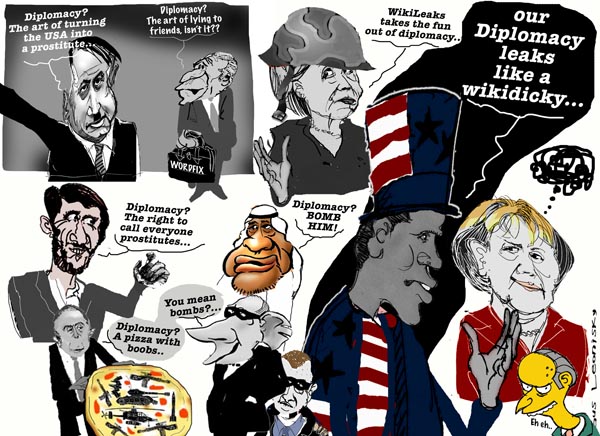Search
Recent comments
- humanoids....
18 min 3 sec ago - refugees....
2 hours 17 min ago - tonight....
2 hours 27 min ago - 10 days?....
2 hours 37 min ago - MI6 parrot.....
3 hours 31 min ago - not sorry....
3 hours 56 min ago - trump's law.....
4 hours 4 min ago - confiscation....
5 hours 7 min ago - mocking....
6 hours 13 min ago - never met....
7 hours 12 min ago
Democracy Links
Member's Off-site Blogs
diplomatic insults...

The doors to a previously hidden world of diplomatic intrigue and insults were dramatically thrown open last night as the whistle-blowing website Wikileaks published its vast tranche of secret American diplomatic communiqués. The release of hundreds of thousands of secret messages from staff at US embassies revealed how Washington has struggled to confront the geopolitical realities of a post-9/11 world.
It also exposed the often less than diplomatic language used by State Department insiders to describe some of the planet's most powerful leaders.
- By Gus Leonisky at 29 Nov 2010 - 1:32pm
- Gus Leonisky's blog
- Login or register to post comments
bunkum on top of claptrap...
Gus: A few news organisations around the world have been privileged to access and analyse the Wikileaks secret documentation for a couple of weeks now... No restrictions were imposed on what they did with it, except they had to agree to not publish until wikileaks website posted the information. Most of these media organisation have also navel gazed about their rights to publish the information and its analysis despite the protest from the US administration. In fact, these media organisations would not publish unless Wikileaks did first as there is a strong penalty for grand treason such as this. Once the information is in the "public domain" there is no fear of reprisal unless the entire WWW is shut down. The media organisations would be furious at the way the "news" which they paraphrase often on behalf of the administration, has been a lot of deceit, glossy lies and official bunkum...
The question of dealing with classified information is rarely easy, and never to be taken lightly. Editors try to balance the value of the material to public understanding against potential dangers to the national interest. As a general rule we withhold secret information that would expose confidential sources to reprisals or that would reveal operational intelligence that might be useful to adversaries in war. We excise material that might lead terrorists to unsecured weapons material, compromise intelligence-gathering programs aimed at hostile countries, or disclose information about the capabilities of American weapons that could be helpful to an enemy.
On the other hand, we are less likely to censor candid remarks simply because they might cause a diplomatic controversy or embarrass officials.
Government officials sometimes argue — and the administration has argued in the case of these secret cables — that disclosures of confidential conversations between American diplomats and their foreign counterparts could endanger the national interest by making foreign governments more wary of cooperating with the United States in the fight against terrorists or other vital activities.
Providing an Analysis
Of course, most of these documents will be made public regardless of what The Times decides. WikiLeaks has shared the entire archive of secret cables with at least four European publications, has promised country-specific documents to many other news outlets, and has said it plans to ultimately post its trove online. For The Times to ignore this material would be to deny its own readers the careful reporting and thoughtful analysis they expect when this kind of information becomes public.
But the more important reason to publish these articles is that the cables tell the unvarnished story of how the government makes its biggest decisions, the decisions that cost the country most heavily in lives and money. They shed light on the motivations — and, in some cases, duplicity — of allies on the receiving end of American courtship and foreign aid. They illuminate the diplomacy surrounding two current wars and several countries, like Pakistan and Yemen, where American military involvement is growing. As daunting as it is to publish such material over official objections, it would be presumptuous to conclude that Americans have no right to know what is being done in their name.
In the coming days, editors and reporters will respond to readers on the substance of this coverage and the decision to publish. We invite questions at askthetimes@nytimes.com.
The US diplomatic lies have diplomatic immunity...
The United States has rejected talks with WikiLeaks over its planned release of confidential US documents, saying the whistle-blower website is holding them in violation of US law.
The US State Department set out its position in a letter to WikiLeaks founder Julian Assange and his attorney that was released to the media.
"We will not engage in a negotiation regarding the further release or dissemination of illegally obtained US government classified materials," State Department legal adviser Harold Koh wrote.
"As you know, if any of the materials you intend to publish were provided by any government officials, or any intermediary without proper authorisation, they were provided in violation of US law and without regard for the grave consequences of this action.
http://www.abc.net.au/news/stories/2010/11/28/3078701.htm?section=justin
The US diplomatic lies have diplomatic immunity...
listen to john pilger...
http://www.abc.net.au/rn/breakfast/stories/2010/3083583.htm